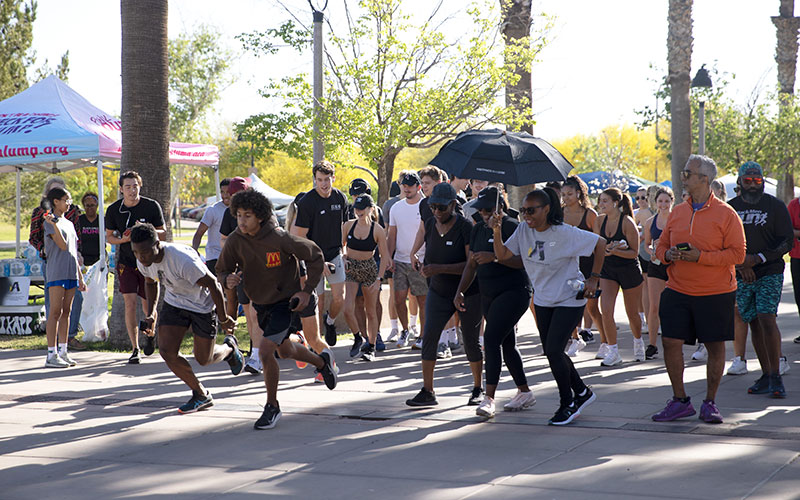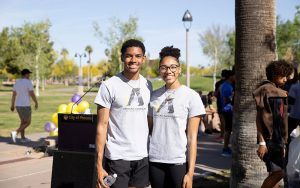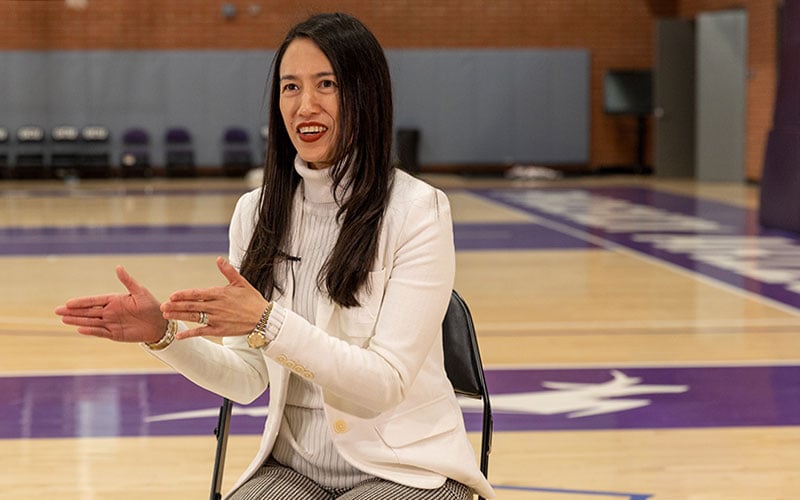
Over 50 people gathered for a recent 5K run at Steele Indian School Park that was put on by African American Reconstruction, whose mission is to empower the Black community and cultivate a climate that creates opportunities for advancement. (Photo by Miles Aronson/Cronkite News)
PHOENIX – George Floyd’s 2020 death while in police custody sparked controversy in the United States on a variety of fronts. For Greyson Taylor and Dariana Brown, Floyd’s death galvanized them into action.
Taylor co-founded a non-profit organization, African American Reconstruction, while Brown joined as its first outreach director. Their mission is to empower the Black community and cultivate a climate that creates opportunities for advancement.
“We’re all heavily involved in the African American community, so it was our responsibility to fulfill that purpose,” Brown said.
Over the past year, AAR has reached out to professional sports teams and partnered with the Phoenix Suns, Arizona Cardinals and Arizona Coyotes, but their relationships are about more than financial assistance.
“We look for organizations that share those same core values and have a common mission so we can all work together with resources and accomplish our goal,” Brown said.
And they don’t just talk the talk. When AAR hosted one of its biggest events as an organization, the “Empowering Generations 5K” race, Taylor was out there running the run.
“Seeing everyone’s smiles during the 5K was extremely rewarding,” Taylor said. It’s a great feeling knowing the impact we were able to have on everyone there and the community as a whole.”

Co-founder Greyson Taylor, left, and outreach director Dariana Brown of African American Reconstruction were the hosts of the first annual Empowering Generations 5K run. (Photo by Miles Aronson/Cronkite News)
The Coyotes, who in 2019 became the first NHL team with a Latin American owner in Alex Meruelo and team president in Xavier Gutierrez, are an ideal fit for AAR.
“We definitely want to continue to partner with the Arizona Coyotes because of their mission in the core values of Gutierrez and the ones they have as an organization,” Taylor said.
Their shared vision can lead to discussions about history and the need to avoid seeing it through a single lens.
“I don’t even like the term Black history because history is history,” Brown said. “There’s no reason that we should be written out of textbooks.”
Educating people on comprehensive Black history is AAR’s goal. One of the ways they strive to do so is through an annual summer workshop in which guest speakers from all walks of life are brought in to inform and inspire young African Americans.
Religion factors heavily into AAR’s framework. Brown said, “Our goal is to honor God and always put him at the forefront of our plans by impacting people’s lives. It’s greater than any amount of money that we could get at the end of the day.”
So it was no surprise that one of the guest speakers was former Arizona State wide receiver Ryan Jenkins, who has been a college pastor for ASU through North Phoenix Baptist Church since March 2021.
“I talked about the history of black Christianity,” Jenkins said. “A lot of times younger African American Christians don’t really know the history or the role that Christianity has played in our own heritage.”
Jenkins took it a step further, suggesting that the history lessons extend beyond the church, to the classroom where Black figures who have played prominent roles in the shaping of American ideologies and culture are often overlooked.
In this belief, Jenkins is aligned with the philosophy of AAR, which stresses five issues, or pillars: economic development, equitable public education, equal justice, political equity and healthcare.
“I totally agree that African American history should be interwoven into every bit of curriculum just as much as American history is because I believe that they’re one of the same,” Jenkins said.
Brown described education as “the backbone of all of our pillars.”
In a 2022 U.S. News report, Arizona ranked 37 out of 50 in the United States in pre-K to 12th-grade education. That represented significant improvement from 2021 when the state was 47. Taylor would like to believe that AAR’s advocacy has helped make a difference in the quality of public education in predominantly minority communities.
“We prioritize making sure that laws are being changed for equitable public education so that we can fulfill the goals of the other pillars that we have,” Taylor said.
The curriculum has to be meaningful to make a difference. For example, in states like Arkansas, Illinois and New Jersey, Black history is required to be taught in schools, but often the attention paid to the subject is fleeting. In the United States, only eight percent of class time on average is devoted to Black history, according to a 2017 SocialStudies.org report.
“Oftentimes in classrooms, we have experienced a vague and brief overview of Black history and students get the privilege to really learn about real Black history,” Taylor said.


